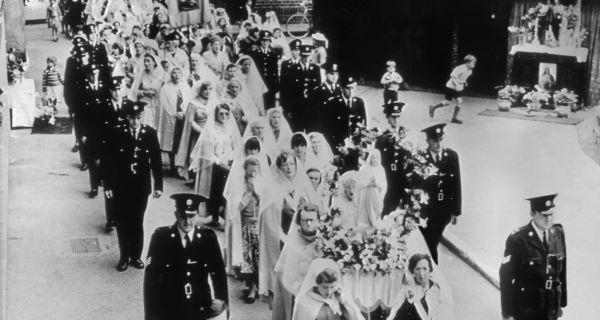By Aislinn O’ Keeffe
The power of the Catholic Church in Ireland was cemented even before the founding of the Irish Free State in 1922. The instatement of Penal Laws in the 17th and 18th century ensured that the repression of the Church would become tied to an Irish sense of identity for much of its population. However, ultimately the power and influence of the church ultimately lay with its connections to the ruling class of the new state.
Counter-revolution
In the early part of the 20th century there was a real potential for radical, socialist change in Irish society, particularly from 1918 to 1920. Events such as the 1913 Lockout, the 1918 General Strike against conscription, and the Limerick Soviet of 1919 displayed a general mood amongst workers for radical social change. What transpired however, in 1922 was a counter-revolution which saw the Catholic, big farming and capitalist class take power.
While sectarian state was created in the North the Unionist Party in power, the capitalist class in the South saw an opportunity in the ideological homogeneity of the Catholic faith (there were more than 3 million Catholics in Ireland according to the 1926 census). Throughout the 1920’s and 1930’s, the capitalist establishment made the Catholic Church its ideological wing of the newly formed Irish State. Effectively, the Church was used as a tool for maintaining social order in a highly fraught political climate and in turn, this gave Catholic institutions immense power over the lives of ordinary people.
A repressive regime
As the church preached the Catholic way of life from the pulpit, Free State governments enacted legislation which limited women’s participation in public life. Women were barred from serving on juries, from working in certain industries and from continuing employment after marriage in the public sector. Catholic ideology preached that a woman’s place was in the home rearing children and being domestic and care providers, an ideology which became enshrined in the 1937 Constitution. Providing this essential, unpaid work freed up male workers to serve the capitalist economy with their labour, this is something which of the capitalist system generally.
The Catholic Church proved to be a formidable propaganda machine laying down the rules for even the most intimate of human relations. Sex was forbidden outside of marriage and there was a complete ban on all forms of contraception. The State handed over control of all welfare duties to the Church such as schools, hospitals, Mother and Baby Homes and Magdalene Laundries. Through each of these institutions it could enforce its repressive regime and impose its ethos on the population, particularly women and children. Many women and their children who did not fit into the ideal of the heterosexual patriarchal family, pushed by the Catholic Church and the capitalist class, faced institutionalisation and other horrendous abuses of their human rights.
Holding the line
By the 1960s and 1970s, however, civil rights and women’s liberation movements grew across the world and began to sprout in Ireland also. Women and workers began to assert themselves and demand their rights. The State, which had long enabled the Church, reluctantly conceded some gains. Sensing that its influence was on the wane after the de-criminalisation of contraception in Ireland and the liberalisation of abortion in the US and Britain, the Church doubled down on its efforts. A concerted campaign was begun by Catholic lobby groups to insert a provision into the Irish Constitution which would forbid the possibility of legalising abortion on Irish soil.
This became the 8th amendment which passed in a referendum in 1983. The 1980’s saw a slew of tragic cases for women as a result of the prevailing Catholic attitudes towards women’s sexuality and reproductive functions including; the deaths of Sheila Hodgers and Anne Lovett, the Kerry babies case, and the continuation of the barbaric practice of symphisiotomy. More recently we have seen the cases of Ms. X, Ms. Y, and Savita Halappanavar among many others who have suffered as a result of the 8th amendment.
Why we need a socialist left
The Catholic Church in Ireland has opposed every improvement in the lives of Irish citizens including; divorce, decriminalisation of homosexuality, civil partnerships and, most recently, marriage equality. Throughout the history of the Irish State both it and the Church have colluded to serve each other’s interests.
This shows that when opportunity presents itself the capitalist classes will capitulate on previous gains in order to maintain social control. Ultimately they do not want create a precedent where can expect their rights to be fulfilled. For this reason, it is essential to break with the capitalist establishment parties who are invested in preserving the status quo and who are not invested in breaking the Church-State alliance. The only path to achieving radical social change and with it, a separation of Church and State, is through the election of a left socialist government committed to breaking with the capitalist system entirely.












